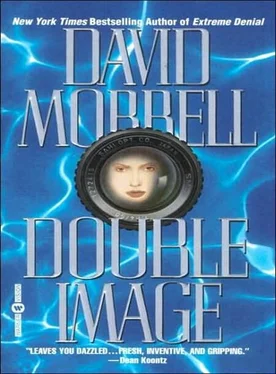The plaza appeared, stalls set up for market day, villagers shopping, children scampering. A centuries-old church stood at one end. A stone well and a trough for watering animals occupied the middle. Coltrane parked outside a tavern called La Primorosa, the Beautiful Woman, and surveyed the activity. This far south, much of the population was Indian, their copper-colored narrow faces, sloped foreheads, and pointed chins looking especially strong in profile, reminding Coltrane of the sharp details on newly minted pennies. The men wore white cotton trousers and shirts, their large sombreros woven from what might have been strands of dried palm-tree leaves. The women wore ankle-length skirts and colorfully embroidered blouses. All were either barefoot or in sandals. Hoping that his camera wouldn’t offend them, trying to conceal it, he took several photographs through his open window, the possibilities exciting him. If he could capture the textures before him…
“Assuming that is your estate up there,” he said, “you live in a pretty good neighborhood.”
A teenage girl went by, selling yellow gardenias nestled in a banana frond. He called her over, bought one of the flowers, and gave it to Tash. “A homecoming present.”
“A little premature, but a lovely thought.” Tash smelled the flower, enjoying its fragrance.
Puzzled, Coltrane noticed that the girl hadn’t moved. What’s the matter? he wondered. Does she want me to buy more? Didn’t I pay enough? But the girl wasn’t gazing at him – only at Tash. “You’ve got a fan.”
Tash smiled at the girl, who looked startled by the attention, stepped back, and hurried into the crowd.
“You’re going to have to tone down your smile,” Coltrane said.
“Probably not used to outsiders.”
They got out of the station wagon.
Coltrane assessed the Coca-Cola sign on the exterior of the tavern he had parked next to. “I suppose this is as good a place as any to ask if anybody knows about the estate up there.”
But before he could enter, he paused for an elderly woman with waist-long braided hair who frowned as she approached them. Passing, she frowned back harder.
But not at Coltrane.
“First the flower seller. Now that woman. What’s going on?” Tash said.
A bandy-legged gray-haired man carrying a chicken by its feet looked astonished when he noticed Tash.
“ What on earth ?” Tash asked.
“I don’t get it, either,” Coltrane said. “I’m the one who looks foreign. If you were wearing a long native skirt and your hair was braided, you’d fit right in. They should be staring at me .”
Another woman stared.
“Come on. Let’s get off the street,” Tash said.
They crossed hard-packed earth, stepped under a canopy of palm leaves, and entered the tavern. Coltrane’s eyes took a moment to adjust to the softer light. The place was clean. It had a plank floor, simple chairs, and trestle-style tables. A child petted a dog in a corner. Americans, presumably from the yacht, looked up with mild curiosity, nodding before redirecting their attention to bottles of Corona beer. Locals, however, set down their drinks and looked startled.
So it isn’t just that we’re outsiders, Coltrane thought. Trying to seem oblivious, he escorted Tash to the worn mahogany counter. But as he started to ask the bartender what he knew about the buildings on top of the cliff, a row of photographs on a warped shelf behind the bartender caught his attention.
Simultaneously, the gangly bartender glanced up from washing cups, got a look at Tash, and couldn’t stop his mouth from hanging open.
“My God,” Coltrane said. He pointed toward the photographs. They were old and yellowed – a dozen eight-by-tens. They all depicted a beautiful woman, hence the name of the tavern, La Primorosa. The face of the woman was the same in each photograph. In unconscious imitation of what the flower-selling teenager had done when Tash smiled at her, Coltrane gaped. “Rebecca Chance.”
“They think it’s me,” Tash murmured.
“ Un fantasma ,” the bartender managed to say.
“No,” Coltrane said hurriedly in Spanish. “Not a ghost. My friend is the granddaughter of the woman in the photographs.”
“ ¿La nieta ?”
“ Sí ,” Coltrane said. “ De Rebecca Chance .”
“ ¿Señorita ?” a frail voice asked.
They looked toward a stoop-shouldered, white-haired, white-bearded man in the doorway. Unlike the Indians in the village, he had a broader facial structure – of Spanish descent.
“ ¿Quién es usted ?” Who are you? The old man seemed afraid to ask.
“ Mi nombre es Natasha Adler .”
“ La nieta ,” the bartender said. The granddaughter.
The old man stepped uneasily closer. Behind him, a crowd had gathered beneath the portal.
“ ¿Es verdad ?” The old man paused before Tash, studying her. Is it true?
“ Sí .”
“ Después de tanto tiempo .” After so much time. The old man continued in Spanish: “You must speak with Esmeralda.”
The name jolted into Coltrane’s memory. Esmeralda had been the first name of the woman whom Tash’s mother had said was Tash’s grandmother. But she couldn’t be. Rebecca Chance was Tash’s grandmother.
“Esmeralda Gutiérrez?”
“ Sí. Mi esposa ,” the old man said. My wife.
A SPLENDID FLOWER GARDEN SEPARATED THE SMALL COTTAGE from the rain forest. Sitting in chairs made of woven branches, with glazed cups of papaya juice on a table in front of them, Coltrane and Tash peered mystified toward a wizened, cinnamon-skinned, white-haired woman, who kept staring at Tash, shaking her head, and fingering her rosary.
“You look exactly like her,” the old woman, Esmeralda, said in Spanish, pointing toward faded photographs of Rebecca Chance that her husband had brought from the house.
“My mother claimed that you were my grandmother,” Tash replied in Spanish.
“No,” Esmeralda said, “although I did take care of your mother.”
How old must she be ? Coltrane wondered in dismay. In her eighties ?
“Especially afterward.”
“Afterward?”
“After your grandmother’s death.” Esmeralda’s voice was whispery with age. Coltrane had to lean forward to hear what she said.
“Then why did my mother lie to me?”
“Why does anyone lie? To avoid the truth.”
“Do you know the truth?”
The old woman nodded. “I regret so.”
“Drink,” Esmeralda’s husband said. “This talking will make you thirsty.”
Esmeralda dropped her rosary into her lap and used both hands, slightly atremble, to raise her cup of juice to her wrinkled lips, then set it back down. “Why have you come here?”
“Because of a man named Randolph Packard.”
The old woman grimaced.
“You know of him?”
“Too well. If he sent you here-”
“No. He died recently.”
Esmeralda’s aged eyes narrowed. “Randolph Packard is dead?”
“A few months ago.”
“Then the world is a better place, but I pity the poor souls in hell.”
“I inherited some property from him. We think it’s the estate on top of the cliff to the south of the village.”
“Burn it.”
“What?”
“Destroy it. It can only bring you harm.”
“What are you talking about?”
The old woman shook her head in distress.
“Tell them,” the old man said. “It was so long ago. If Randolph Packard is truly dead, you no longer have anything to fear.” He looked at Tash and Coltrane for confirmation.
“I saw his ashes sprinkled into the ocean,” Coltrane said.
Читать дальше












